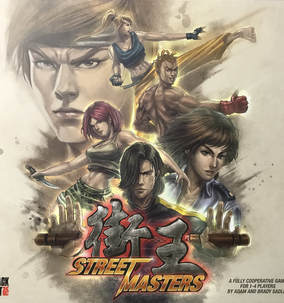 Full disclosure: Blacklist Games kindly provided me with a review copy of Street Masters. What is this game about? Street Masters: Rise of the Kingdom is what would happen if Double Dragon and Sentinels of the Multiverse had a love child. Street Masters is a beat-'em-up board game that is all about taking down the bad guys. It combines tactical movement around a stage tile, card play, and die rolling. As in Sentinels, players, enemies, and the environment are controlled by individual decks of cards. Each of the fighters you can play has his or her own personality and set of strategic strengths and weaknesses. Each fighter also has an individualized deck. You can pit your fighters against one of several enemy decks—each of which plays differently and is led by a unique boss—and within one of several stages, which are also controlled by stage-specific decks of cards. When you attack enemies, hits are not guaranteed. You have to roll dice to see if you were successful. The good news, however, is that no die roll in Street Masters is entirely useless. If you don't land the hits you want, you collect defense tokens instead. Defense tokens allow you to block different types of incoming damage from enemies (punch, kick, or grapple). They also play another extremely important role in the game—every time you defend against an enemy hit, you are a step closer to charging up your character, which allows you to use an extra-strong special ability. All of these pieces come together to truly create the feeling and flow of a fighting game, but without all the button mashing. (Maybe you were great at combos as a kid, but I was... not.)  I really need to learn to paint. I really need to learn to paint. How does it play solo? Street Masters is a cooperative game designed for 1–4 players, and it scales beautifully. It is entirely possible to play as a single fighter, although I currently prefer to play with two just because I like looking for strategic character combinations. For those of you who are more interested in story and campaign modes, Street Masters offers both "story mode" and individual hero stories that can be completed separately or within a larger campaign. I'm really liking what story mode has to offer. Win or lose, you get to move on in the story but with different consequences. Hero stories add even further zing. When playing hero stories, your decks actually change from stage to stage depending on what happens, so a loss in a campaign isn't just a loss, but something that adds depth to the tale you're spinning out. I love that the evolution of a fighter's deck is tied to progress within a storyline, and it does feel like you've gone somewhere with your characters when a campaign comes to an end. I wouldn't say that campaign mode is the meat of the game, but it doesn't feel tacked on, either. It's fun, and I'm hoping to see more of this mode of play as Street Masters grows and expands. 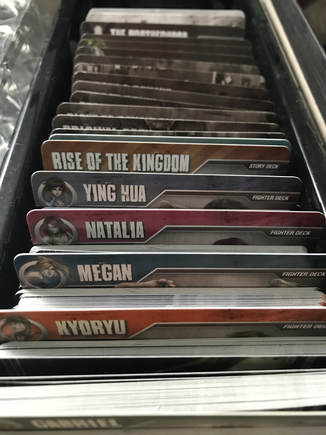 So many beautiful decks! So many beautiful decks! Overall Thoughts I am really enjoying Street Masters. There is no question that this game has been lovingly nurtured by its designers, Adam and Brady Sadler. Every aspect of Street Masters is steeped in theme, and you really do get the feeling of being in a fighting game. There are a lot of card abilities and moving pieces to think about, but the rules themselves are not overly difficult to learn because they all make sense—they are perfectly tied in with the theme. I love that. Each deck in the game is also extremely well thought out. If you enjoy Sentinels of the Multiverse but sometimes wish that the environments had a bit more purpose, then Street Masters will really scratch that itch. Each deck of fighter cards truly feels different and promotes a different play style, and the game has sufficient depth to reward multiple plays as you learn to master each fighter's deck and true strategic potential. The enemy bosses each feel different and keep things flavorful and fun. And the stages are used to prevent each game from being just another beat-'em-up. The fact that each stage comes with its own setup and objectives makes the game more interesting. I also love that die rolls are rendered less frustrating in Street Masters, because a miss generates defense tokens, which will be highly beneficial to you on future turns. I am also happy to see that the Sadler brothers seem committed to developing Street Masters and expanding it over time. Right now Street Masters is a brand new game, but I'm looking forward to seeing how my relationship with it develops over the years. I compared Street Masters with Sentinels of the Multiverse, which is one of my all-time favorites, and I hope it ends up having one further similarity: I hope Street Masters becomes one of those games that just gets better over time, as expansions come out and the game world grows. My one quibble with Street Masters might be that it, like Sentinels, can leave you to deal with a lot of tokens and card abilities. I don't particularly mind this myself, but if keeping up with a lot of moving parts drives you crazy, then you should be aware that it can happen in this game. Do I recommend it? Absolutely. I am having so much fun with Street Masters. I expected to like it, but it has far exceeded my expectations. I'd say it's an absolute must try. Overall Rating; 4.5 stars (likely to become a 5 over time) Rating Scale: 5 stars — I love it! 4 stars — I really like it. 3 stars — I like it. 2 stars — It's okay. 1 star — Meh.
1 Comment
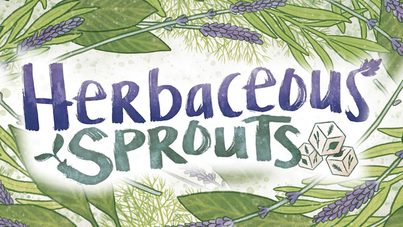 We're almost halfway through the year, everybody! And Kickstarter isn't slowing down. Here is this week's roundup of solo playable Kickstarter games. 1. Herbaceous Sprouts Herbaceous Sprouts is a dice game that, like its card game predecessor, is about planting. However, this new incarnation includes a lot more of the process. Herbaceous Sprouts allows you to collect seeds, use gardening tools, and grow your own herb and flower sprouts to plant. Pencil First Games has a history of producing beautiful, relaxing games with solo modes designed by Keith Matejka, known for the excellent Roll Player (expect a review here soon) as well as for Pencil First's Herbaceous and Sunset Over Water. You can also expect more beautiful art from Beth Sobel. This one definitely has my interest. 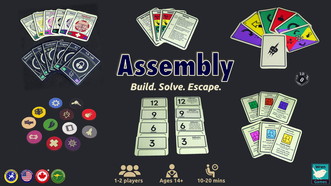 2. Assembly Assembly, a small box puzzle game from Wren Games, is a light and quick puzzle game with a crazy backstory. You work in space as a luxury spaceship builder when a deadly virus kills everyone on the base except for you. The base's computer is actively trying to trap you on it forever because you might be carrying the virus, but since you are clearly immune, you need to get home to share your genetic good fortune with others. To escape, you need to successfully build a spaceship within a certain amount of time.  3. Journal 29 Revelation This is very much a solo game—more like a book full of riddles to work through. The premise of this game is that you are uncovering a mystery about an excavation, learning the truth about what happened to the original team one puzzle at a time. When you think you've solved a puzzle, you use the app to enter your answer and receive a code that you need for the next riddle. I love this kind of thing and I'm definitely intrigued by the project. I haven't played this one or its predecessor, Journal 29., but the reviews I've seen online have been positive, and I like a good brain burner. I'm considering this one myself. 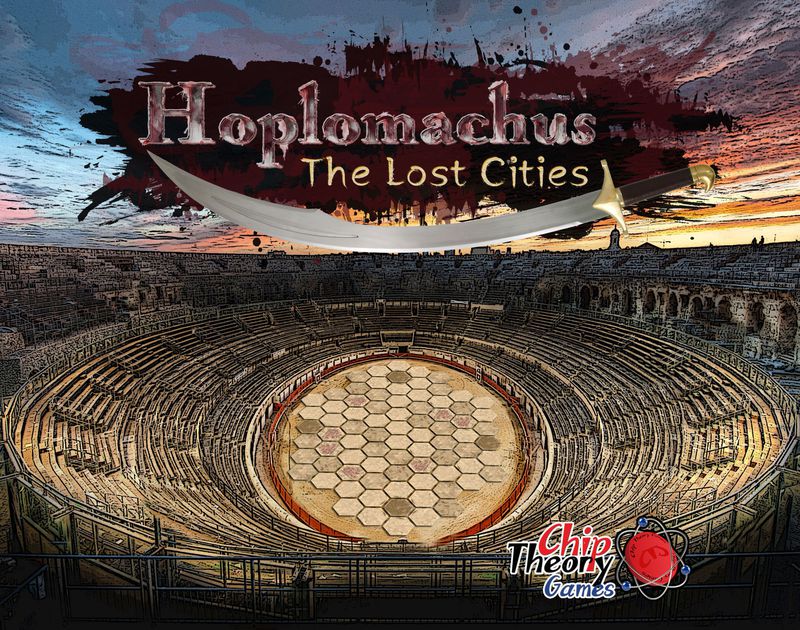 What is this game about? Hoplomachus: The Lost Cities is about blood, sand, and glory. Three mythic lost cities—El Dorado, Xanadu, and Atlantis—have sent their finest warriors to Rome to do battle and prove their ultimate supremacy! Each team of gladiators fights with an especially powerful champion, who is supported by a number of gladiators who bring different specialties to the fight. In Hoplomachus, battles take place on a giant neoprene mat with a beautifully printed arena, and gladiators are represented by luxurious-feeling poker chips. Players move their gladiators within the arena, seeking advantages and trying to get their best hits in. Destroying other gladiators and holding specific locations within the arena help players gain crowd favor. A player who pleases the crowd sufficiently can pick up new tactics, and eventually a new and powerful gladiator, for her team. There is some luck involved—each gladiator rolls a certain number of dice for each ability he uses, and gladiators are drawn randomly before deployment—but Hoplomachus is very much a game of strategy. Each die color has different odds of hitting the target, and there are battle tactics that can enhance the likelihood of success. If you want to reign supreme in the arena, you need to play smart and know when to take your shots. 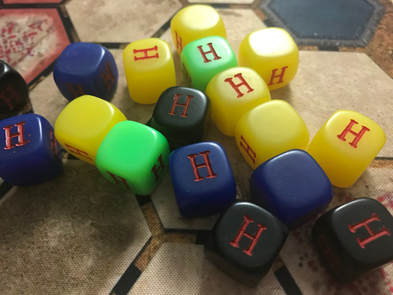 Hoplo hit dice! Hoplo hit dice! How does it play solo? Hoplomachus: The Lost Cities has a system for solo play that allows you to combat big bosses and several minions. If your champion can survive three rounds of combat—without regenerating his health between rounds—you win. Each enemy, also represented by a poker chip, has its own relatively simple rules for movement that govern combat. Beasts move somewhat randomly (they are untamed and stuck in an arena, after all) but will attack a gladiator who gets too close. Criminals quickly make their way towards your champion, while the big bosses approach you with devastating special attacks. Overall Thoughts I really like Hoplomachus: The Lost Cities. The AI opponents can be very tough when you are trying to survive for three entire rounds, and they move in ways that make it interesting to fight against them. I love figuring out how best to deploy different gladiators from different cities, and there is just enough luck in the game to make it feel convincing (if frustrating at times). The only potentially serious issue this game has, in my opinion, is that there are limited enemy types and movements, and the bosses are basically all just huge and super-powerful beings who attack you for big numbers. Also, after several plays you will get entirely used to the gladiators from each city and have go-to strategies for each. If you play it enough times in a row, The Lost Cities can feel just a bit same-y. But overall, it's a hugely satisfying gaming experience, and I am so happy to have Hoplomachus in my collection. With expansions, I am completely head over heels for it. Hoplomachus: The Lost Cities is the first game in a larger system that includes Hoplomachus: Rise of Rome and Hoplomachus: Origins, as well as multiple small expansions. Do I recommend this game? I absolutely recommend Hoplomachus. It's fun, it's fast, and it's endlessly engaging. The biggest possible holdup is the price tag: Chip Theory Games does not sell its games at retail. Hoplomachus is a boutique game sold only through the Chip Theory site and made with high quality components. Get ready to part with your money. If you want a smaller, cheaper introduction to the Hoplomachus system, start out with Hoplomachus: Origins. I'm interested in Hoplomachus. Where should I start? I think you have two options when getting started with Hoplomachus. In my opinion, for gameplay purposes, it is best to start with The Lost Cities and then work your way through the games in order of their release, meaning you'd move on to Rise of Rome and then to Origins. However, if you want a smaller, faster, cheaper game before you commit, then you ought to start with Hoplomachus: Origins. The solo trials are awesome and you will love it. But honestly, if you start with Rise of Rome, you'll like that one too. This is a fantastic set of games. Overall Rating: 4 stars (5 stars when combined with Rise of Rome) Rating Scale: 5 stars — I love it! 4 stars — I really like it. 3 stars — I like it. 2 stars — It's OK. 1 star — Meh. 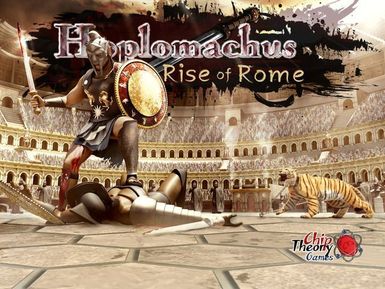 What is this game about? Like its predecessor, Hoplomachus: The Lost Cities, Hoplomachus: Rise of Rome is a game in which gladiators fight it out in the arena for victory and for the favor of the crowd. Rise of Rome is a standalone game, but if you have the original, all of the cities are fully compatible with both games. This gives you plenty of opportunities to mix and match. Players once again fight to protect their champion while eliminating an opponent's, using less powerful but very helpful support gladiators to attack, defend, and use battle tactics. The game is played out on a large neoprene arena where gladiators—represented by lovely poker chips—vie for tactical dominance. Each gladiator attacks with a unique combination of dice, and different colored dice have different odds of scoring a hit. Rise of Rome uses essentially the same combat system as The Lost Cities, but it does have a different way of earning crowd favor. Rather than racing up a linear crowd favor track, players can instead move up multiple different pathways to claim tactics. After all tactics have been claimed, it's time to race for a fancy new gladiator. There are also some different types of terrain that give you something new to deal with/exploit during battle. How does it play solo? Hoplomachus: The Lost Cities had a relatively simple AI system that allowed players to battle against arena beasts and bosses. Rise of Rome offers something new: Titans. While the enemy movements and attacks were relatively predictable in Lost Cities, Rise of Rome offers challenging opponents are more complicated and demand more complicated strategies. This does mean that there is a bit more bookkeeping—the AI in The Lost Cities was simpler, but it was also a lot simpler to operate. All the same, I think Rise of Rome is a fantastic addition because it offers a totally different and more advanced challenge for solo gamers. 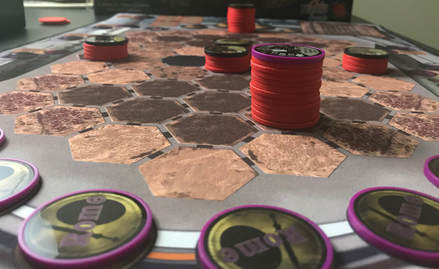 Hadrian of Rome challenges a boss from The Lost Cities on the first game's playmat. The Lost Cities and Rise of Rome are compatible with each other. Hadrian of Rome challenges a boss from The Lost Cities on the first game's playmat. The Lost Cities and Rise of Rome are compatible with each other. Overall Thoughts I am a fan of Hoplomachus as a whole, and I think Rise of Rome is an awesome addition to the series. The Titans contribute a lot to the solo game, and in many ways are more satisfying than the AI from the first game (although I still play Lost Cities in solo mode because sometimes simple is good). However, Rise of Rome includes only two cities, and as a result might be a bit less satisfying as a standalone game. (Hoplomachus: The Lost Cities included three cities: Atlantis, El Dorado, and Xanadu.) In the end, I think that Lost Cities and Rise of Rome really need each other to fully shine. They also both mix very well with the smaller expansions that Chip Theory Games has published for the series. Do I recommend it? Absolutely. Hoplomachus is among my top games. I have nothing against "beat your own score" games, but I love solo games with interesting AI to fight against. Hoplomachus: Rise of Rome has very interesting AI opponents to fight with, and that really does it for me. I'm interested in Hoplomachus. Where should I start? I think you have two options when getting started with Hoplomachus. In my opinion, for gameplay purposes, it is best to start with The Lost Cities and then work your way through the games in order of their release, meaning you'd move on to Rise of Rome and then to Origins. However, if you want a smaller, faster, cheaper game before you commit, then you ought to start with Hoplomachus: Origins. The solo trials are awesome and you will love it. But honestly, if you start with Rise of Rome, you'll like that one too. This is a fantastic set of games. Overall Rating: 4 stars (5 stars when combined with Hoplomachus: The Lost Cities) Rating Scale: 5 stars — I love it! 4 stars — I really like it. 3 stars — I like it. 2 stars — It's OK. 1 star — Meh. 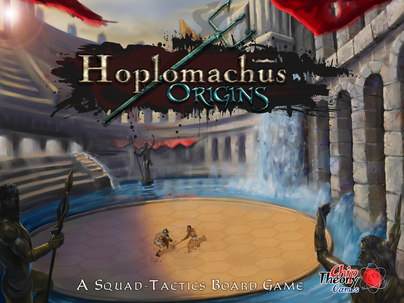 What is this game about? Like its older siblings, The Lost Cities and Rise of Rome, Hoplomachus: Origins is all about gladiatorial combat. Teams of gladiators, represented by very high quality poker chips, fight it out by moving strategically around an arena that is printed on a neoprene mat. Lost Cities and Rise of Rome, however, are much larger in scale. The boxes are enormous, and the arena mats are huge. Hoplomachus: Origins is a much smaller and tighter game. (Cheaper, too!) The three arena mats that come in the box are closer to mouse pad size, and there isn't a lot of room to dance around. Also, rather than select your gladiators by pulling them blind from a bag, Hoplomachus: Origins asks you to draft your own teams when you play. Instead of large scale battles, Origins offers players several shorter and smaller challenges to complete. How does it play solo? Hoplomachus: Origins offers competitive PvP play, but it also shines as a solo game. Included in the box are twenty solo trials, which start out easy but quickly become blisteringly difficult. They can get pretty tricky, and the AI definitely puts up a good fight. In some ways, the challenges offer more variety than what you find in the earlier Hoplomachus games. 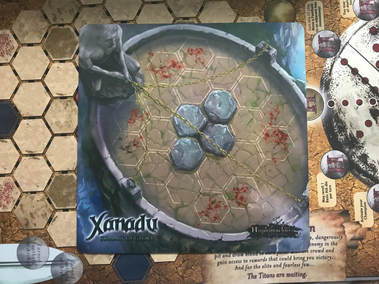 One of the Origins arenas on top of the Colosseum from Rise of Rome. There is a notable difference in size. One of the Origins arenas on top of the Colosseum from Rise of Rome. There is a notable difference in size. Overall Thoughts I love the quick, brutal battles that Hoplomachus: Origins offers. For players who like shorter and tighter play sessions, Origins might be the better choice. For its size, Origins offers tremendous replay value, partially because you will need to replay challenges. On some of the tougher ones, you may have to experiment with which combinations of gladiators you use until you get it just right. And you can't just find a team you like and stick with it all the way through—the drafting rules, level requirements, and strategic considerations change with every trial, forcing you to be a more versatile player. There aren't as many units in the box as you would find in The Lost Cities or Rise of Rome, but Origins offers more than enough variety to keep you entertained for a while. That said, I do miss the larger scale battles that are possible on the larger arena mats. Origins battle maps are very tight, and the solo trials are very structured. I enjoy the breathing room that Lost Cities and Rise of Rome can give me. Do I recommend it? Definitely. Chip Theory Games has a lot of expensive products, and Hoplomachus: Origins is on the lower end at $60. If you want an affordable entry point into the Hoplomachus series, Origins is a very good choice. This is especially true if you like shorter games with lightning fast setup. Origins is also a game that is mentally challenging enough to keep you coming back for more. I'm interested in Hoplomachus. Where should I start? I think you have two options when getting started with Hoplomachus. In my opinion, for gameplay purposes, it is best to start with The Lost Cities and then work your way through the games in order of their release, meaning you'd move on to Rise of Rome and then to Origins. However, if you want a smaller, faster, cheaper game before you commit, then you ought to start with Hoplomachus: Origins. The solo trials are awesome and you will love it. But honestly, if you start with Rise of Rome, you'll like that one too. This is a fantastic set of games. Overall Rating: 4 stars Rating Scale 5 stars — I love it! 4 stars — I really like it. 3 stars — I like it. 2 stars — It's OK. 1 star — Meh. 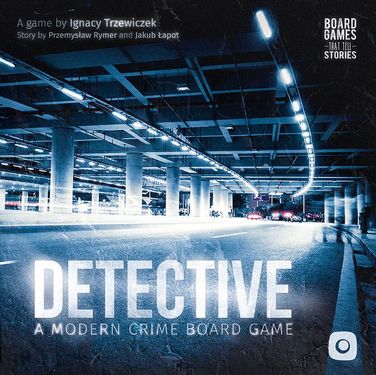 Hey there solo gamers! As usual, Kickstarter is filled with interesting projects to back, and I'm here to alert you to some of them in case they interest you. I'm keeping this one short, but there is an explosion of fresh campaigns about to start in the near future. So gird your loins and your wallets! 1. Detective: A Modern Crime Board Game Detective: A Modern Crime Board Game isn't actually on Kickstarter at all. It's on its own special site, where you can preorder it from Portal Games. Detective is a story-driven board game for 1–5 players in which you solve a series of connected cases. The five cases in the box come together to form one overall campaign, and you’ll need to use your imagination and your wits to make it all the way to the end. You’ll be expected to take good notes, apply information from previous cases, and combine what you’ve learned from scattered clues in order to make sense of it all. There are also multiple ways to solve each case, so you may not see all of the game’s content, even if you do solve all of this cases. Detective: A Modern Crime Board Game is really meant to mimic the feeling of solving a crime, which means it’s an intellectual challenge with no easy answers. If this sounds like a game for you, make sure to place a preorder soon—there is a limited stock of 1000 copies. I will warn you though: The base game is only $50, but prepare to pay shipping from Poland, which is going to cost you about $30 if you’re in the United States.  2. Sprawlopolis Button Shy Games has made a habit of running short but very successful Kickstarter campaigns. Sprawlopolis is a pocket-sized, cooperative city planning game that offers plenty of variety and challenge, while also costing only $10. If you're into microgames, this looks like a good one for a great price. There are only 4 days left in the campaign, though, so if you're interested, you might want to have a look soon. 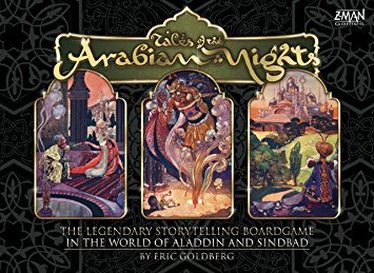 To watch a quick tutorial for this game, click here. What is this game about? Tales of the Arabian Nights is a storytelling game in which players travel the world, seeking adventure before they return to Baghdad to recount their exploits. At the start of the game, each player chooses a character—options include Scheherazade, Sinbad, and Ali Baba—and a secret number of story and destiny points that they must reach before returning to Baghdad and declaring victory. Winning, however, is not really the point of Tales of the Arabian Nights. In this game, your goal is to have an adventure. Everywhere you go, you will encounter someone or something and make a choice about how to interact with them. Those choices affect what happens next in the game, and your fate is read aloud from a huge storybook that comes in the gamebox. Last time I played Tales, I took students to a board game café in Québec and we stumbled through it in French. One of us ended up being absorbed into an ancient relic, another listened to a story that was so long that he lost his mind, and we all had romances that ended very, very badly. It was hilarious. I do not, however, remember who won—story and destiny points are not dealt out in any predictable way, so there is no strategy you can follow to ensure victory. You just have to go along for the ride. 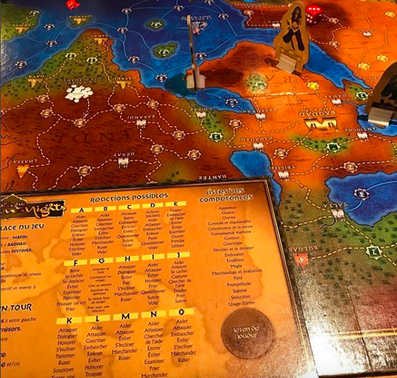 This was much more difficult in French. This was much more difficult in French. How does it play solo? Tales of the Arabian Nights is technically a game with a winner, but the win condition is so random that it is not really a competitive game. You can definitely get a kick out of this game just by taking a character out for a spin, making any story choice you like, and seeing what happens. If you want them, there are some official solo rules from Z-Man, but given that there is no way to strategically "win" this game, there isn't much point to a solo win condition. I am not even convinced that solo is the best way to play Tales of the Arabian Nights. The events that happen in your story are so ludicrous that you'll want someone to share them with. There's nothing like being able to remind people about the time they got into a fistfight with a street urchin or attempted to seduce a princess and failed miserably. A lot of this game's fun is in the social aspect of playing it. Overall Thoughts I have a lot of affection for Tales of the Arabian Nights. To me, it pushes the boundaries of what it means to play a game—in a good way. While you could sneer and say that it's "just an activity," I prefer to think of it as a game whose value comes not from winning or losing but from the experience of playing it. If you can get into its quirkiness and laugh about the random course your in-game life will take, you are in for a treat. I will say, however, that Tales of the Arabian Nights is a bit clunky. Sometimes all of the tokens and game elements get in the way of carrying on with the story, which is a shame. There are other storytelling games out there now that are more streamlined, although none of them are quite so hilariously random as Tales. Do I recommend it? If you know what you're getting into, Tales of the Arabian Nights is delightful. But look elsewhere if you want to focus on victory or strategy. This is the kind of game where you hop on the boat and go wherever the wind takes you. Overall Rating: 3 stars (4 if you play with other people) 5 stars — I love it! 4 stars — I really like it. 3 stars — I like it. 2 stars — It's okay. 1 star — Meh. 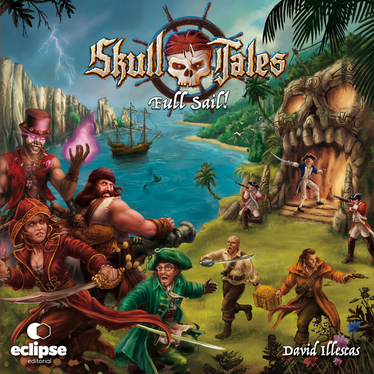 Image swiped from BGG. Image swiped from BGG. I've already covered most of the major KS projects that are going on right now, but there are still a few out there that are pretty exciting! I don't know about y'all, but it's already been a brutal year for my acquisition disorder. But I expect no mercy. 1. Skull Tales: Full Sail! Skull Tales looks like it might be good fun—there are a few pirate-themed games out there, but this one looks like a dungeon crawl for scurvy seadogs. The game offers multiple maps, cool pirate miniatures, one-off scenarios, and, most importantly, a full campaign to play through. As a solo gamer, I'm always looking for games that are story-driven, and it's possible that this one could scratch the itch. The game has multiple phases that simulate managing a pirate ship, adventuring in new lands, and returning to port to get in touch with civilization. Outside of Skull Tales' own marketing, I am particularly intrigued by the fact that AJ from Van Ryder games plugged it in the most recent update. Skull Tales is not officially associated with Van Ryder, but AJ has traditionally published very good games that I like, and also games that cater to solo players. His endorsement has definitely gotten my attention.  Image swiped from KS campaign. Image swiped from KS campaign. 2. Streets of Steel If you are into old school side-scrolling arcade games, then Streets of Steel may be of interest to you. It's a co-op board game with miniatures, but also artwork that is inspired by fighting games. You can even adjust the difficulty by starting with different amounts of "quarters," which I think is a really nice arcade touch. It's clear that a lot of thought has been put into little details like that throughout the game. The main characters each have a bit of flair and there is cool flavor text associated with them, and all of the material I have seen for the game so far is polished and oozing with personality. There do not, however, seem to be many third party playthroughs, and those are something I like to see in Kickstarter campaigns. True to its roots, this one looks like a pure beat-'em-up, without a ton of storyline. If that's your thing, this project may be worth checking out. During the Super Bowl this year, Eli Manning starred in an ad that trashed solo gaming as an activity that was about as exciting as "ladling soup." Naturally, I was offended, so I wrote him a letter asking him to apologize by signing a photo of himself that said "I <3 solo board games." You can see the original post here.
It only took about as long as it takes me to plan out a turn of Mage Knight, but lo and behold! He actually did sign the photo! Thanks Eli Manning—I consider our blood feud at an end. I will hold up my end of the bargain and cheer for the Giants for as long as you're on the team. LOL. 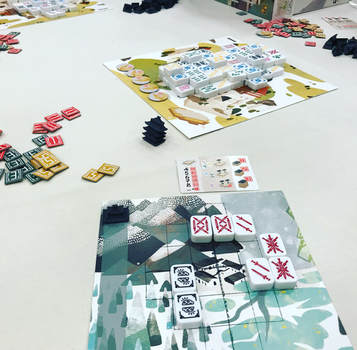 Trying to build up a killer red combo in Dragon Castle. Trying to build up a killer red combo in Dragon Castle. This weekend I went to my first CMON Expo, and it was a ton of fun! I really need to start going to cons. I am always nervous when I first get there, because it's hard to just start sitting down to game with random people. But then it turns out great! Of course, I don't know why that surprises me—board gamers are generally great, and that's what makes our hobby so special. I spent a lot of time just yammering with people, but I demoed some games, too! Spoiler Alert: None of them were solo games. I do occasionally play games with other humans. Surprise! 1. 13 Clues This one was okay. Basically, you have a little cardboard screen that hides a couple of cards you can see... but it also has three slots on the outside that hold cards you can't see. One is a person, one is a place, one is a weapon. There are also several card colors. Your job is to ask questions about what other players can see (e.g. How many men do you see? How many yellow cards do you see?) and use process of elimination to figure out who you are. It wasn't bad or anything, but I'd rather just play Mystery of the Abbey, which is my process-of-elimination game of choice. 2. Dragon Castle I very much enjoyed my first play of this! In younger days, I whiled away many afternoons playing Mahjong on my eMachine, and Dragon Castle totally brought back that addictive feeling. In this game, you and your fellow players take from a common stack of tiles that are piled up Mahjong-style. You can either pull two matching tiles along the edges, take one tile and one shrine (which can be built for points later), or destroy a tile you know someone else really wants. You use the tiles and shrines you take to build up your own little tile tableau, in which you try to get lots of matching symbols to touch each other, stack tiles, and build shrines. I am not entirely sure how I would feel about this game if I played it ten times in a row. Would I love it more? Would it all start to feel same-y? I'm not sure. But my first play was a blast, and I think my students would love this. 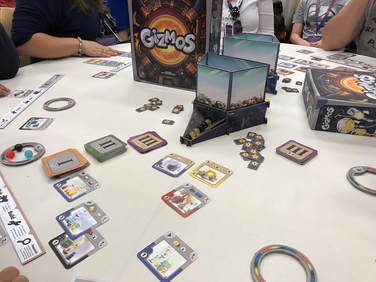 We were in the middle of setting up when I took this shot, but as you can see, you draw marbles (energy) from a little contraption and purchase building cards off of three market rows. We were in the middle of setting up when I took this shot, but as you can see, you draw marbles (energy) from a little contraption and purchase building cards off of three market rows. 3. Gizmos I got to play a prototype copy of Gizmos yesterday, and I really enjoyed it. It reminded me of Potion Explosion because of the contraption you use to draw energy—it's another one of those cardboard containers with a slide for colorful marbles. But I think I like Gizmos better. It's an engine builder in which you acquire cards that will score you victory points. But cards also allow you to perform extra actions. So even though you are only allowed to take one action per turn, the right chain of card effects can turn a simple marble pull into a whirlwind of activity. I've only played Gizmos once, but I definitely want to play it again—and I do not think it would be difficult to design a solo mode for this one. Gizmos has one other major benefit: The turns are relatively fast, so it does not take very long at all to play a full game, and you don't have to spend very much time waiting around for your next turn. That is never a bad thing! While I preferred the look of Dragon Castle, I think Gizmos might offer more long term enjoyment. 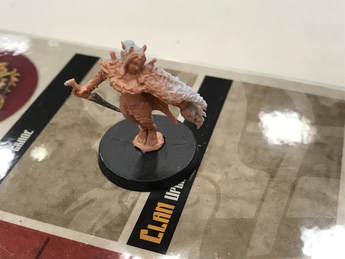 Behold! The amazing work of Vernon Piper, Dice Tower painter extraordinaire! Behold! The amazing work of Vernon Piper, Dice Tower painter extraordinaire! 4. Blood Rage! OK, so this was not an official demo game—I just got to play my first game of Blood Rage with a fun group of people, including Vernon Piper. In fact, we played Vernon's painted set. Didn't he do a great job? I am just kidding, he had a few unfinished minis in the box and I'm cranky because he crushed the rest of us. Warning: If you play Blood Rage with Vernon Piper, hate draft every single card with the word "Loki" on it. 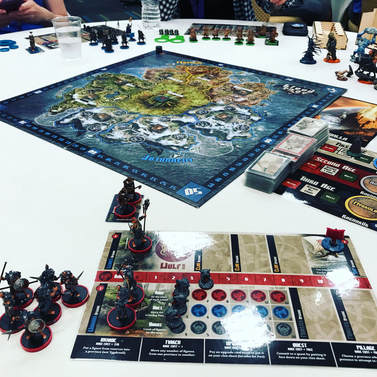 The board before we started shedding lots of blood in our rage. The board before we started shedding lots of blood in our rage. Actually, I had a blast playing Blood Rage and would definitely do so again. The card interactions are a lot of fun, the monster upgrades are fun, and it's definitely a game that gets better with repeated plays because it's easier to form a strategy when you know what you're working with. Make sure to play with people who will find it enjoyable to get into fights and who will be good sports about it, though! I think I had such a good time in part because my group was so great. CMON Expo was a very positive experience for me, and I'm appreciative of everyone who made it that way—friends from my game group who have made my first year in Georgia a very good year, people from The Dice Tower I "know" from the internet but actually met for the first time, and all of the friendly strangers who sat down for a game with me and made my day a great one. P.S.: I may or may not have closed out the evening with a game of Time's Up, but there is no way I'm showing you photos of that... what happens in Time's Up stays in Time's Up! |
AuthorMy name is Liz Davidson, and I play solo board games. A lot of solo board games... Archives
August 2021
Categories
All
|

 RSS Feed
RSS Feed